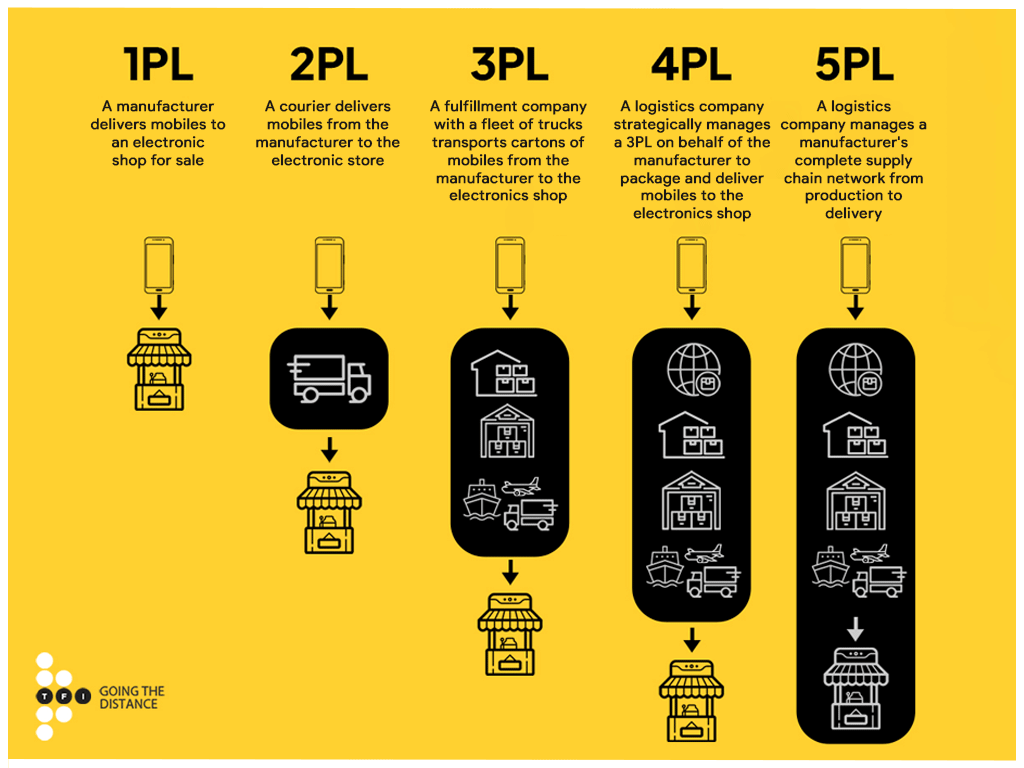
1PL (First-Party Logistics)
2PL (Second-Party Logistics)
3PL (Third-Party Logistics)
4PL (Fourth-Party Logistics)
5PL (Fifth-Party Logistics)
The term ‘third-party logistics’ (3PL) is familiar to many. It involves outsourcing supply chain elements, such as warehousing, distribution, value-added services, and fulfilment to third-party providers. However, there are other logistics classifications, including 1PL, 2PL, 4PL, and 5PL. Each term has its own definition and unique differentiators. Let’s explore them in detail below.
1PL (First-Party Logistics)
In first-party logistics (1PL), the responsibility of transporting cargo, freight, goods, or products from one location to another lies with a single entity, whether it be a company or an individual. The 1PL model involves a straightforward process with only two parties involved. On one side, there is the manufacturer or distributor, acting as the shipper of the goods. On the other side, there is the retailer or customer, who receives the goods. Unlike other logistics models, there are no intermediary middlemen involved in the entire process, making it a direct transaction between the shipper and the receiver.
2PL (Second-Party Logistics)
In the context of second-party logistics (2PL), the focus is on asset-based carriers that take charge of transportation methods. These carriers possess the necessary resources and infrastructure to facilitate the movement of goods. Hauling companies with a vehicle fleet, airlines that manage planes, and shipping lines that operate ships are some of the examples of 2PL providers. Given that they primarily specialise in transportation service, they are often referred to as forwarders.
For instance, an airline company might offer freight services to ensure the efficient delivery of goods from the shipper (you) to the intended recipient (your customer). Their core business revolves around providing the means of transportation required for the logistics process.
3PL (Third-Party Logistics)
Third-party logistics (3PL) entails the outsourcing of logistics and supply chain operations to help companies efficiently deliver their products to customers. 3PL providers offer a range of logistics solutions, including receiving, storing, packing, and shipping services. In addition, many 3PL companies offer value-added services that go beyond the core logistics functions. These services may include inventory management, kitting & assembly, postponement packaging, and more.
With years or even decades of experience in managing logistics, 3PL service providers in the UAE possess the expertise and resources to streamline the process, making it simpler, faster, and more cost-effective for the seller. The demand for 3PL services has surged alongside the rapid growth of e-commerce, and it’s worth noting that a significant portion of Fortune 500 companies (86%) and Fortune 100 companies (96%) rely on such services. The advent of tracking technologies like radio frequency identification (RFID) and global positioning system (GPS) has further enhanced supply chain transparency, contributing to the expansion of the 3PL market. Additionally, advancements in internet of things (IoT) technology have improved tracking metrics for trucking and other transportation providers, facilitating smoother logistics operations.
4PL (Fourth-Party Logistics)
Fourth-party logistics (4PL) providers are integrators that take charge of managing all aspects of the supply chain. In addition to physical logistics, a 4PL may encompass elements of information technology (IT), procurement, and finance. While the differences between a 3PL and a 4PL may appear subtle, the distinction becomes significant when a company seeks the right mix of services and support for its growing business.
Both 3PL and 4PL providers rely on cutting-edge IT systems to optimize supply chain communication and accuracy. However, a 3PL is more likely to utilize proprietary technology for tracking units throughout the supply chain, bundling this service into their overall support cost. On the other hand, a 4PL is inclined to offer higher-level data analysis to inform long-term business decisions, going beyond mere tracking capabilities.
In addition to the benefits provided by 3PL providers, a 4PL includes:
- Project management, sourcing, and negotiation – A 4PL takes charge of managing projects, handling sourcing activities, and negotiating on behalf of the client.
- Logistics strategy and analytics – A 4PL offers strategic insights and employs analytics to optimize logistics operations and improve overall supply chain performance.
- Impartial service advice – Being impartial, a 4PL compares services and costs offered by different providers, ensuring that the client’s best interests are prioritized.
- A single point of contact – A 4PL serves as a central point of contact, coordinating various service providers and streamlining communication for the client.
Crucially, a 4PL operates with impartiality. While they may offer the services required by their clients, they compare these services and costs with those of competitors, always working in the best interests of the customer. The objective is to provide unbiased recommendations and ensure that the client receives the most advantageous solutions for their specific needs.
Knowing the distinct needs and requirements of your business is critical when choosing between 3PL vs 4PL.
5PL (Fifth-Party Logistics)
The term 5PL represents a relatively new concept in the logistics industry, highlighting the evolution towards comprehensive logistic integration through multiple outsourced providers. In the realm of 5PL, the focus lies on achieving a fully integrated logistics solution that covers the entire supply chain, from its inception to the final delivery, by leveraging multiple outsourced service providers.
The key to success in implementing a 5PL model is the effective integration of information technology (IT) and computer systems. This integration is crucial for ensuring real-time visibility and control over the entire supply chain, regardless of the number of different suppliers involved. By harnessing advanced IT systems, a 5PL provider can monitor, manage, and coordinate the activities of various logistics service providers, enabling seamless collaboration and efficient supply chain operations.
The concept of 5PL embodies the drive towards achieving a holistic and synchronized approach to logistics, where different parties collaborate to optimize the flow of goods and information. Through the effective integration of IT systems, 5PL providers can offer real-time insights, enhanced coordination, and improved decision-making capabilities to facilitate the smooth functioning of the entire supply chain.
Bottom Line
In the world of logistics, each option—be it 1PL, 2PL, 3PL, or 4PL—comes with its own set of advantages and disadvantages. Instead of getting caught up in debates about which option is superior, it’s essential to step back and assess the specific needs of your business.
- A 1PL system offers simplicity and complete control over the logistics process. However, it may hinder growth and become less effective as the business matures or expands.
- A 2PL system is also relatively straightforward but provides fewer logistics solutions compared to the more intricate 3PL or 4PL models.
- As a company reaches a certain level of maturity and requires a 3PL, it entails relinquishing some control to outsource the day-to-day logistics operations. However, the trade-off is increased flexibility, broader reach, and consistent service.
- Opting for a 4PL means surrendering nearly all control over the supply chain. The 4PL assumes the majority of management and design functions. While these functions are tailored to the specific needs of the business, they are predominantly handled outside of the company’s direct involvement.
Ultimately, the choice of logistics approach depends on striking the right balance between control, flexibility, scalability, and efficiency, aligning with the unique requirements and growth trajectory of the business.
Unlock Your Business’s Growth with TFI’s Reliable 3PL Solutions
As one of the leading logistics companies in Dubai, TFI offers holistic 3PL solutions ranging from warehousing to distribution, customs clearance, value-added services, and global freight forwarding, to name a few. We take pride in our ISO-certified customs-bonded and non-bonded 3PL warehouse facilities as well as digital-driven capabilities. Combining the powerhouse of our expertise and experience, we aim to boost your business’s efficiency through stock accuracy, on-time delivery, and reduced returns.



